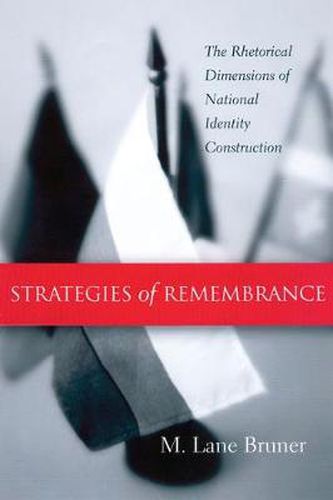Readings Newsletter
Become a Readings Member to make your shopping experience even easier.
Sign in or sign up for free!
You’re not far away from qualifying for FREE standard shipping within Australia
You’ve qualified for FREE standard shipping within Australia
The cart is loading…






An analysis of how public arguments centered on
the people
contribute to the complex process of nation building; At a time when national identity is a potent political force, Strategies of Remembrance sheds light on the relationships between economic, civic, cultural, and ethnic forms of nationalism, and on the interactions of nationalism in those forms with the politics of memory and the thetoric of democracy. Despite the broadly acknowledged fact that national identities are negotiated through discourse, concrete studies of the process are rare. By focusing on rejected public addresses, critically investigating reactions to those speeches, and examining what he calls
narrative omissions
- what politicians are constrained from saying in an official capacity - M. Lane Bruner elucidates the complex relationships between public speech and community building. Strategies of Remembrance visits Europe in the waning years of the Cold War, as manipulations of national identity functioned both to erase the painful memories of National Socialism and to promote West Germany’s role as the vanguard of democratic capitalism - while Germans were characterized as the victims of the Second World War. Bruner looks at Russia prior to the adoption of a new constitution in 1993, when appeals to national identity functioned primarily to corruptly facilitate the transition from a centralized to a market economy while the Soviets and democracy were characterized as incompatible, Last, he turns to Quebec’s attempt in 1995 to secede from Canada and explains how, after a narrow defeat, secessionist supporters shifted from ethnic and cultural to civic nationalism in a Quebec where historically secession had been justified to protect French Canadian culture. Together, Bruner’s studies suggest the important role the fashioning of national identities will continue to play in the twenty-first century and the need for ongoing critiques of the rhetorical means employed.
$9.00 standard shipping within Australia
FREE standard shipping within Australia for orders over $100.00
Express & International shipping calculated at checkout
An analysis of how public arguments centered on
the people
contribute to the complex process of nation building; At a time when national identity is a potent political force, Strategies of Remembrance sheds light on the relationships between economic, civic, cultural, and ethnic forms of nationalism, and on the interactions of nationalism in those forms with the politics of memory and the thetoric of democracy. Despite the broadly acknowledged fact that national identities are negotiated through discourse, concrete studies of the process are rare. By focusing on rejected public addresses, critically investigating reactions to those speeches, and examining what he calls
narrative omissions
- what politicians are constrained from saying in an official capacity - M. Lane Bruner elucidates the complex relationships between public speech and community building. Strategies of Remembrance visits Europe in the waning years of the Cold War, as manipulations of national identity functioned both to erase the painful memories of National Socialism and to promote West Germany’s role as the vanguard of democratic capitalism - while Germans were characterized as the victims of the Second World War. Bruner looks at Russia prior to the adoption of a new constitution in 1993, when appeals to national identity functioned primarily to corruptly facilitate the transition from a centralized to a market economy while the Soviets and democracy were characterized as incompatible, Last, he turns to Quebec’s attempt in 1995 to secede from Canada and explains how, after a narrow defeat, secessionist supporters shifted from ethnic and cultural to civic nationalism in a Quebec where historically secession had been justified to protect French Canadian culture. Together, Bruner’s studies suggest the important role the fashioning of national identities will continue to play in the twenty-first century and the need for ongoing critiques of the rhetorical means employed.